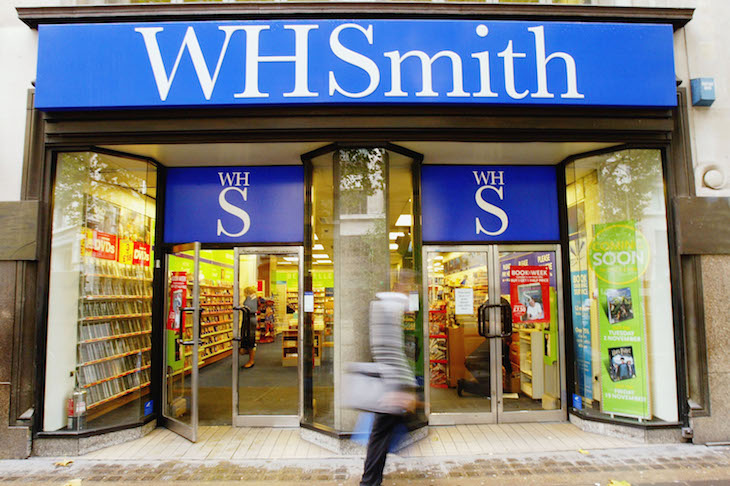I’m not in the least surprised to learn that WH Smith has been voted Britain’s worst high-street retailer in a Which? survey of more than 10,000 consumers: this is the eighth year in a row that the newsagent and bookseller has come bottom or second-to-bottom in the same poll. These days its cramped shops give more shelf space to bottled water than to books, but if you do pick a paperback from the narrow choice of ‘bestsellers’ on offer — or a copy of The Spectator, if you can find it behind Men’s Health and Closer — you’re channelled into a dehumanising encounter with a self-service till, usually followed by an ill-tempered encounter with the staff member whose job it is to stand near the machines to make them work and calm the customers.
Trade in WH Smith’s airport and station outlets rose 7 per cent in the six months to the end of February, while its trade in town centres, afflicted in line with many other retailers, fell 5 per cent. Smiths may no longer be the bellwether of bourgeois reading tastes it once was, but the dismal, cost-squeezed format to which it has been reduced by the application of ‘retail engineering’ is evidently robust, and if you bought the company’s shares a decade ago you would have multiplied your money by five. And let’s face it, the civilised bookstore you and I might wish to find in every terminus and high street hasn’t been able to make money for years, as was proved by Waterstones — which last month was sold by its previous Russian rescuer to a US private equity firm, so let’s hope it survives.
Reverting to a favourite theme as entries close for The Spectator’s Economic Disruptor awards, it’s worth pointing out that both Smiths (for convenience) and Waterstones (for choice) were once disruptors of the book trade, just as Amazon (for one-click shopping) has been in the digital era. But as markets evolve, new opportunities constantly emerge. Henry James wrote in 1888 of the ‘tantalising air of clever new things’ to be found at WH Smith’s railway bookstalls, which offered ‘yellowbacks’ — cheap editions for travellers — and a lending service that allowed a book to be borrowed at the start of a journey and returned at the destination. Wouldn’t a 21st-century version of that be a boon for today’s long-suffering, long-delayed rail passenger? Come on, you techies: unloved ‘WH Smug’ (as Private Eye used to call it) is ripe for disrupting.
Disaster movies
‘Film finance is the new Lloyd’s,’ a City gent told me disconsolately this week. ‘A lot of us are going to be wiped out by it,’ whispered another. Two conversations, miles apart, alerted me to a story I felt I should know more about. Here’s the nub of it.
It was Gordon Brown as chancellor who introduced new tax reliefs designed to encourage UK film production — and clever tax lawyers who turned them into schemes to generate immediate tax losses for wealthy individuals who could use them to defer current tax liabilities over long periods of time. That was particularly attractive, for example, to footballers with high incomes but time-limited playing careers: the likes of Beckham and Rooney reportedly took the bait.
In brief, the schemes involved ‘limited liability partnerships’, heavily leveraged with debt, which bought film rights and leased them back to the production companies involved. A small amount of capital invested could apparently deliver a large tax advantage. Many reputable banks promoted the schemes to all manner of rich clients as legitimate, even conservative, vehicles for tax deferral — as opposed to illegitimate ones of the sort that make potential tax charges disappear.
But HMRC, supported by Supreme Court rulings, eventually came to the view that these were avoidance structures rather than ventures with a real business purpose, and is insisting that all but a small slice of the tax relief claimed must be repaid. Fifteen years after the first film schemes were launched, upwards of a billion pounds stands to be collected back, plus the compound interest that is the taxman’s secret weapon. For individuals thus caught, the leveraging of the schemes means the tax bills are many times larger than the sums originally invested.
There’s a broad consensus that tax loopholes should be closed and avoiders chased. But Andrew (now Lord) Tyrie, in his previous role as chairman of the Treasury select committee, was a rare voice last year urging HMRC not to hound into financial distress a group of investors who had relied on the advice of experts, including leading counsel, that the film schemes were above board. These arguments are finely balanced: partly at fault, as ever, is a tax system riddled with tempting complexities. The moral must be: never buy a financial product you don’t understand, especially if it promises a tax break that’s too good to be true.
Tasty snacks
I shop at WH Smith with gritted teeth but I positively salivate when I spot a Pret A Manger. Some serious investors think likewise: the sandwich chain has just been sold for more than £1.5 billion by the US investment firm Bridgepoint to JAB Holdings, the vehicle of the German billionaire Reimann family who also own Krispy Kreme doughnuts and Kenco coffee.
Though recently criticised by the Advertising Standards Authority for describing its sandwiches as ‘natural’ when there are E-numbers in its bread, Pret has sustained the authenticity of its brand while expanding globally with the hand of high finance on its shoulder. That included, for a decade, the incongruous presence of McDonald’s as a 33 per cent shareholder — an investment that funded the chain’s expansion into the US. Like Tyrrells Crisps, the Herefordshire farm venture that was bought by a Texan company in 2016 for £300 million, Pret is an example of what British entrepreneurs and their backers are really good at: of course we’d love to build world-beating digital technology businesses, but we’re better at tasty snacks.







Comments